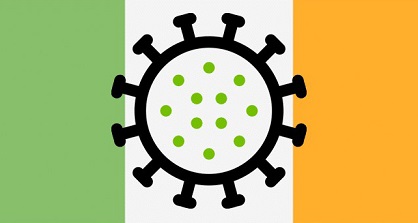COVID-19 News: Ireland Witnesses New SARS-CoV-2 Surge As JN.1 Becomes Dominant Strain
Nikhil Prasad Fact checked by:Thailand Medical News Team Feb 12, 2024 1 year, 2 months, 4 days, 2 hours, 5 minutes ago
COVID-19 News: Ireland finds itself at a critical juncture in the battle against COVID-19 as health officials grapple with a significant surge in confirmed cases of the JN.1 variant of the SARS-CoV-2 virus. The latest statistics, revealing a 39.13% increase in just three weeks, have sparked concerns among public health experts and intensified efforts to understand and combat the new variant.
 COVID-19 News: Ireland Witnesses New SARS-CoV-2 Surge As
COVID-19 News: Ireland Witnesses New SARS-CoV-2 Surge As
JN.1 Becomes Dominant Strain
Local
COVID-19 News coverages also report that more sick individuals are flooding the outpatient clinics at various hospitals across the country but hospital admissions for COVID-19 is still manageable.
The Accelerating Rise of JN.1 Variant
Initially reported on January 18 with 598 confirmed cases, the JN.1 variant has since rapidly gained ground, with the current tally standing at 832 cases in Ireland as of the 3
rd of February 2024.The Health Protection Surveillance Centre (HPSC) issued a cautionary statement, indicating that the JN.1 variant's prevalence has risen sharply since November, with data suggesting the likelihood of further increases in case numbers. While the HPSC reassures that there is no indication of a detrimental impact on vaccine effectiveness or increased disease severity, the dynamic nature of the virus warrants continuous monitoring.
https://www.hpsc.ie/a-z/respiratory/coronavirus/novelcoronavirus/surveillance/summaryofcovid-19virusvariantsinireland/SARS-CoV-2_variant_report_20240207docx.pdf
Global Dynamics of SARS-CoV-2 Variants
Delving into the global context, the prevalence of SARS-CoV-2 variants has been a consistent theme since February 2023. Variants like XBB and other recombinant forms dominated the circulating virus worldwide. Mid-June 2023 witnessed the emergence of XBB1.5 and related lineages with distinctive spike protein mutations - F456L and subsequently L455F. However, the landscape shifted once again in November 2023 when the BA.2.86 sub-lineage, represented by JN.1, started rapidly replacing XBB.1.5-like lineages.
First detected in Israel on August 13, 2023, the BA.2.86 variant has become a global presence, extending its reach to Denmark, the UK, USA, and South Africa. Despite its unusually high mutation count, there is currently no evidence to suggest increased transmissibility or heightened clinical severity associated with this variant. The sub-lineage JN.1, however, has gained prominence in recent weeks, prompting the World Health Organization (WHO) to designate it as a Variant of Interest on December 19, 2023.
Statistical Insights and Outbreaks in Ireland
The statistical data on the JN.1 variant in Ireland reveals a growing concern. Out of the 832 confirmed cases, 269 (32.3%) have been linked to outbreaks in hospital or healthcare settings. The prevalence of JN.1 has steadily increased, reaching an alarming 79.3% of sequen
ces between weeks 42, 2023, and week 3, 2024. In addition to the JN.1 variant, there have been 1,419 cases of infection with 'XBB.1.5-like + F456L' lineages and 243 cases of 'XBB.1.5-like + L455F + F456L' ('FLip') lineages in Ireland.
Symptomatic Presentation of JN.1 Variant
Understanding the symptoms associated with the JN.1 variant is crucial for early detection and containment efforts. Those infected with JN.1 experience symptoms similar to earlier strains, such as a runny nose, cough, and headache. However, recent findings from the UK's Office for National Statistics have identified two additional 'warning signs': trouble sleeping and increased worry or anxiety. The Health Service Executive (HSE) in Ireland emphasizes three primary symptoms to watch for—fatigue, a high temperature/chills, and a dry cough. Furthermore, less common symptoms include loss or alteration of taste or smell, runny or blocked nose, conjunctivitis, sore throat, headache, muscle or joint pain, various skin rashes, nausea or vomiting, diarrhea, and chills or dizziness.
Public Health Measures and Recommendations
In response to the escalating cases of the JN.1 variant, health authorities in Ireland stress the importance of adhering to public health guidelines. Individuals experiencing symptoms are strongly advised to stay at home and avoid contact with others for 48 hours after symptoms have mostly or fully subsided. In the case of a positive COVID-19 test result, the current recommendation is to remain at home and avoid contact with others for five days from the onset of symptoms.
Conclusion
As Ireland navigates the complexities of the escalating JN.1 variant surge, health officials are vigilant, closely monitoring the situation. The multifaceted nature of SARS-CoV-2 variants underscores the need for continuous research, surveillance, and adaptive public health measures. The global community remains committed to understanding and responding to the evolving landscape of the virus, emphasizing the importance of vaccination efforts and individual responsibility in curbing the spread of COVID-19 variants. The ongoing collaboration between scientists, health officials, and the public is crucial in managing the ever-changing dynamics of the pandemic.
For the latest
COVID-19 News, keep on logging to Thailand Medical News
